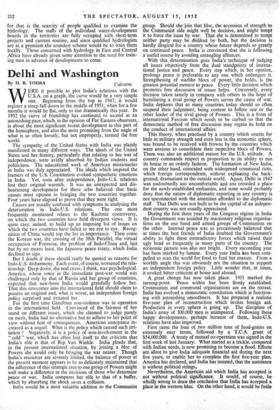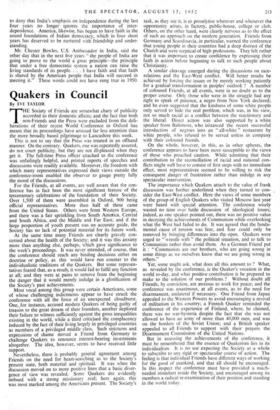Delhi and Washington
WERE it possible to plot India's relations with the U.S.A. on a graph, the curve would be a very simple one. Beginning from the top in 1947, it would register a steep fall down to the middle of 1951, when for a few months it would lie flat, only to rise dramatically this year. In 1952 the curve of friendship has continued to ascend at an astonishing pace, which, in the opinion of Far Eastern observers, is about the most significant recent development in this part of the hemisphere, and also the most promising from the angle of what is so often loosely, but not improperly, termed the free world.
The sympathy of the United States with India was plainly manifested in many different ways. The ideals of the United States and her history, particularly that relating to her war of independence, were avidly absorbed by Indian students and politicians. The educational work of American missionaries in India was duly appreciated. The ideals which inspired the framers of the U.S. Constitution evoked sympathetic emotions in India. Yet, soon after independence, jndo-U.S. relations lost their original warmth. It was an unexpected and dis- heartening development for those who believed that basic causes must operate in bringing the two countries together. Four years have elapsed to prove that they were right. Causes are usually confused with symptoms in analysing the deterioration in Indo-U.S. relations. The one most frequently mentioned relates to the Kashmir controversy, on which the two countries have held divergent views. It is quite easy, indeed, to build up an imposing list of issues on which the two countries have failed to see eye to eye. Recog- nition of China would top the list in importance. Then come the Korean war, the crossing of the 38th Parallel, the virtual occupation of Formosa, the problem of Indo-China and, last but by no means least, the Japanese peace treaty, which India declined to sign. But I doubt if these should really be quoted as reasons for Indo-U.S. disharmony. Each event, of coarse, worsened the rela- tionship. Deep down, the real cause, I think, was psychological. America, whose voice in the immediate post-war world was challenged only by that of Russia and her group of countries, expected that new-born India would gratefully follow her. That this newcomer into the international field should claim to possess an original and, what is worse, an independent foreign policy surprised and irritated her. • For the first time Gandhian non-violence was in operation in the international field. Convinced of the fairness of her stand on different issues, which she claimed to judge purely on merit, India had no alternative but to adhere to her point of view without fear of consequences. American annoyance in- creased as a sequel. What is the policy which caused such irri- tation? Negatively, it is a policy of non-involvement in the " cold " war, which has often lent itself to the criticism that India's role is that of Rip Van Winkle. India pleads that, in the present international situation, by joining a bloc of Powers she would only be bringing the war nearer. Though India's resources are severely limited, the balance of power at the present moment appears to be so delicately maintained that the adherence of this strategic area to one group of Powers might well make a difference in the decisions of those who determine peace or war. India compares her dile to that of a buffer, which by absorbing the shock saves a collision. India would be a most valuable addition to the Communist group. Should she join that bloc, the accession of strength to the Communist side might well be decisive, and might tempt• it to force the issue by war. That she is determined to tempt neither party may be disliked by both, but the decision is hardly illogical for a country whose future depends so greatly on continued-peace. India is convinced that she is following a useful course by avoiding entangling alliances.
With this determination goes India's technique of judging all issues objectively from the dual standpoints of interna- tional justice and peace. Every step which, in her opinion, prolongs peace is preferable to any one which endangers it. Strengthening of warlike blocs of power, she holds, • is the greatest potential menace to peace. Every little decision which promotes free discussion of issues helps. Conversely, every decision taken tamely ih company with others in the hope of humiliating a rival group of Powers serves the cause of war. India deplores that so many countries today should so often suspend their judgement, being content to follow one or the other leader of the rival group of Powers. This is a form of international Fascism which needs to be curbed so that the democratic method of free discussion may regain its hold on the conduct of international affairs.
This theory, when practised by a country which counts for little in' military strength and even less in the economic sphere, was bound to be received with frowns by the countries which were anxious to consolidate their respective blocs of Powers. There was also an additional reason for the U.S. attitude. A country commands respect in proportion to its ability to run its house in an orderly fashion. The formation of New India, on the other hand, coincided -with widespread communal riots, which foreign correspondents, without explaining the back- ground, dramatised to the outside world. Again, Delhi in 1947 was undoubtedly too uncomfortable knd too crowded a place for the newly-established embassies, and none would probably deny that the nature of diplomatic reporting in any country is not unconnected with the amenities afforded to the diplomatic staff. That Delhi was not built to be the capital of an indepen- dent country was not usually appreciated.
During the first three years of the Congress regime in India the Government was assailed by reactionary religious organisa- tions on the one hand and armed groups of Communists on the other. Internal peace was so precariously balanced that at times the best friends of India doubted the Government's ability to fight these .eontradictory forces which raised their ugly head so frequently in many parts of the country. The economic picture was also not bright. Every succeeding year has been marked by famine. Every year India kas been com- pelled to scan the world for food to feed her masses. From a worldly angle this was obviously not the situation to support an independent foreign policy. Little wonder that, at times, it evoked bitter criticism at home and abroad.
A great change has now taken place. 1951 marked the turning-point. Peace within has been firmly established. Communists and communal organisations are on the retreat. India has evolved a democratic constitution which is function- ing with astonishing smoothness. It has prepared a realistic five-year plan of reconstruction which invites foreign aid. Production in every sphere is going up. The discipline of India's army of 300,000 men is unimpaired. Following these happy developments, perhaps because of them, Indo-U.S. relations have also improved.
First came the loan of two million tons of food-grains on extremely easy terms, followed by a T.C.A. grant of $54,000,000. A treaty of mutual co-operation was signed in the first week of last January. What started as a trickle, compared with Indian needs, is now promising to become a flood. Efforts are afoot to give India adequate financial aid during the next five years, to enable her to complete the first five-year plan. America has declared, and India has insisted, that the assistance is without political strings.
Nevertheless, the American aid which India has accepted is not without political significance.- would, of course, be wholly wrong to draw the conclusion that India has accepted a place in the western bloc. On the other hand, it would be futile to deny that India's emphasis on independence during the last four years no longer ignores the importance of inter- dependence. America, likewise, has begun to have faith in the sound foundations of Indian democracy, which in four short years has deserved to be nurtured with friendship and under- standing.
Mr. Chester Bowles, U.S. Ambassador in India, said the other day that in the next five years "the people of India are going to prove to the world a great principle—the principle that under a free democratic system a nation can raise the living standards of its people. . . . I have faith and that faith is shared by the American people that India will succeed in meeting it." These words could not have rung true in 1950.



























 Previous page
Previous page